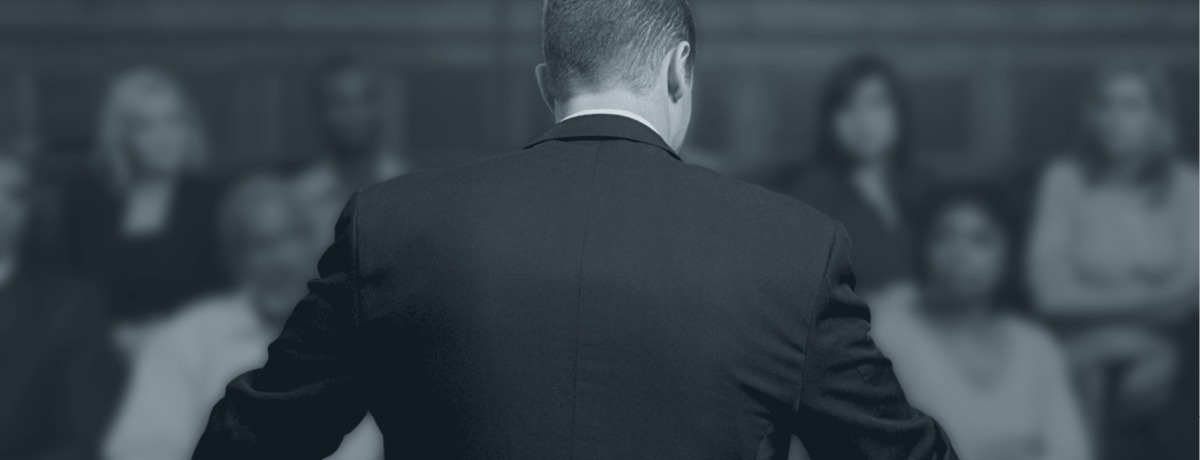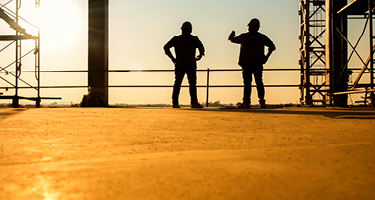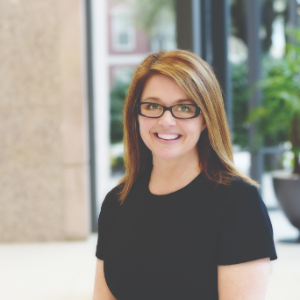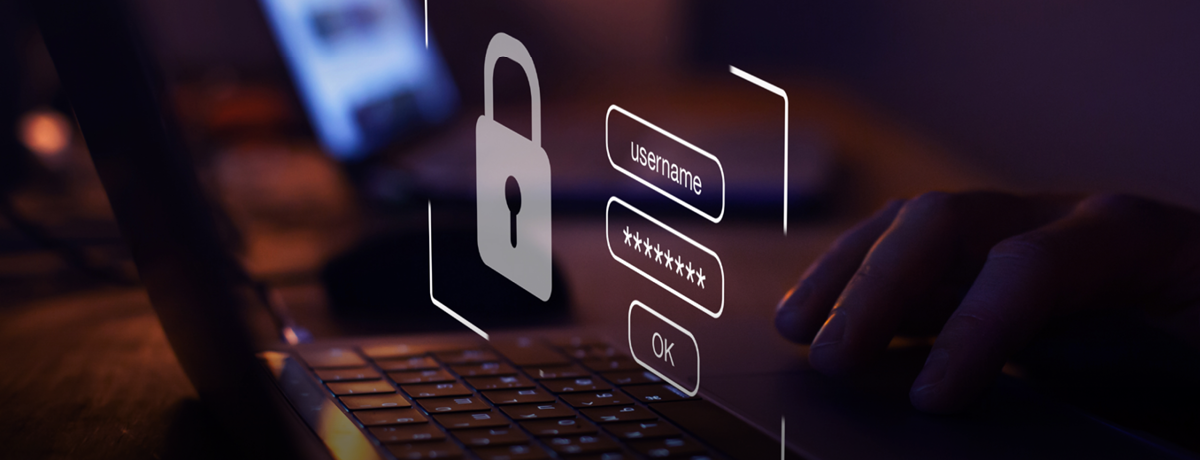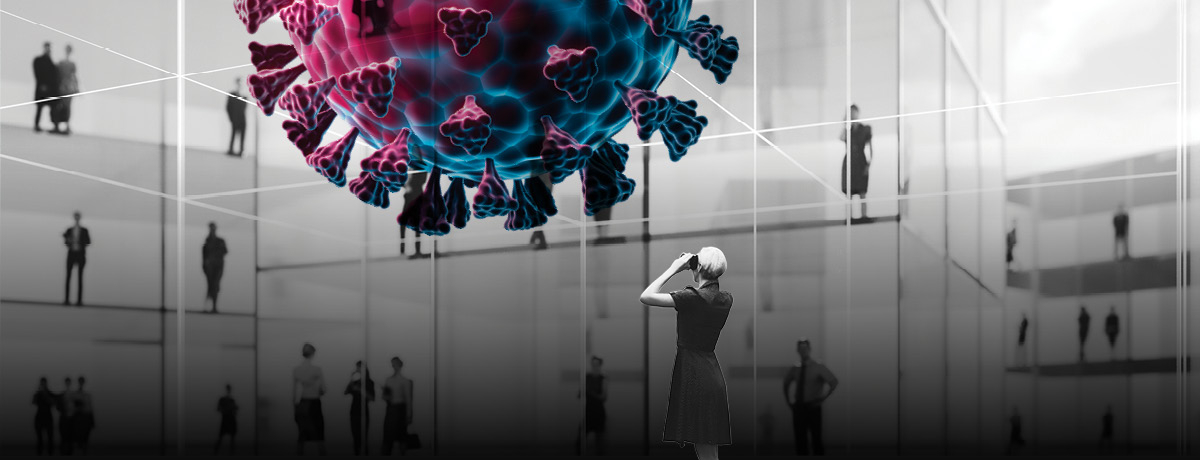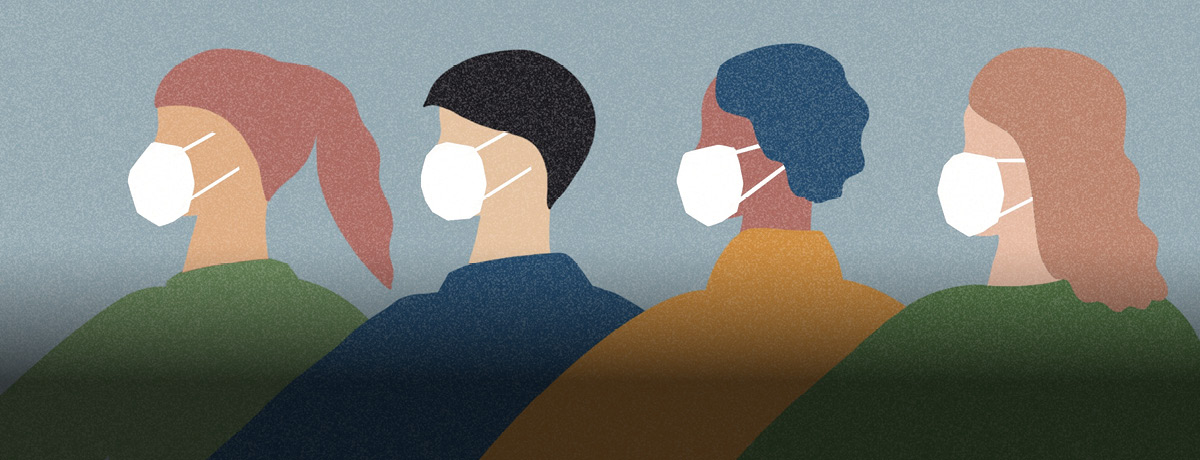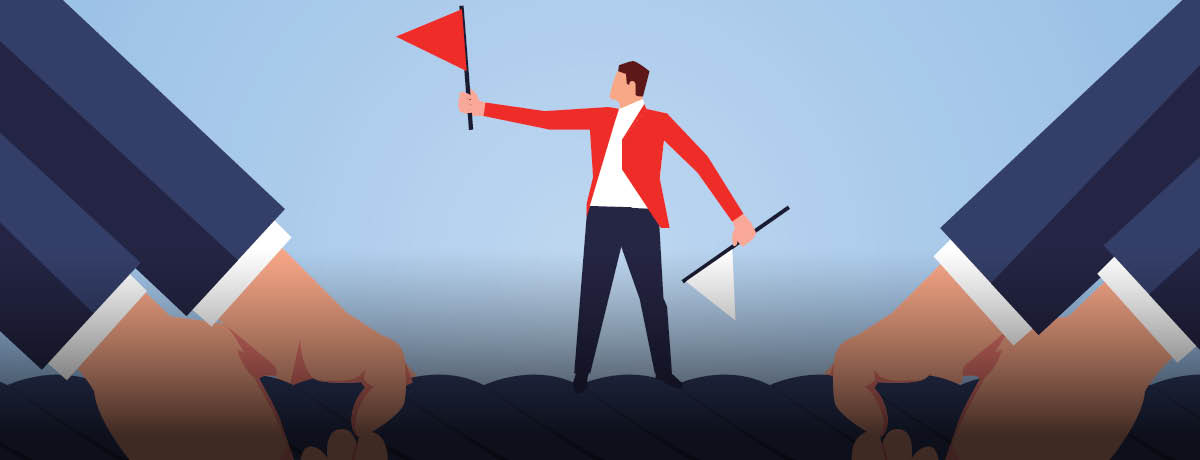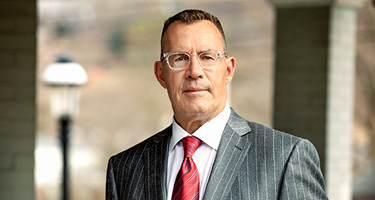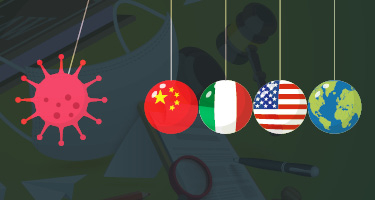The physical, economic, and emotional impact of COVID-19 has the potential to be the single greatest influencer of civil-jury perceptions in the history of our country. Because the health and the economic effects of the Coronavirus have infiltrated every community, and because the nationwide economic shutdown affected every American in some way, the implications of the pandemic on both first-party insurance and third-party tort lawsuits are going to be unprecedented.
When the flood of COVID-19-related litigation reaches the courthouse steps, litigants and lawyers will need to understand how jurors’ experiences during the pandemic will affect how they filter information they get in any case dealing with the coronavirus. This article will examine two extensive nationwide surveys we conducted in the late spring and summer of 2020 to examine these critical issues.
Our Research
We conducted two separate nationwide studies examining potential jury attitudes arising out of COVID-19—one regarding first-party insurance claims for business-interruption losses due to the pandemic, and a second addressing coronavirus liability claims. Our insurance survey was designed to answer the question of whether the scope of COVID-19 losses created national risks for jury nullification in first-party insurance coverage and bad-faith cases for the foreseeable future. We designed our liability survey to assess jury perceptions of tort liability and damage issues in COVID-19 tort claims against restaurants, nursing homes, prisons, transportation providers, and other potential defendants. Both surveys featured more than 150 online questions answered by several thousand exceptionally diverse respondents in all 50 states.
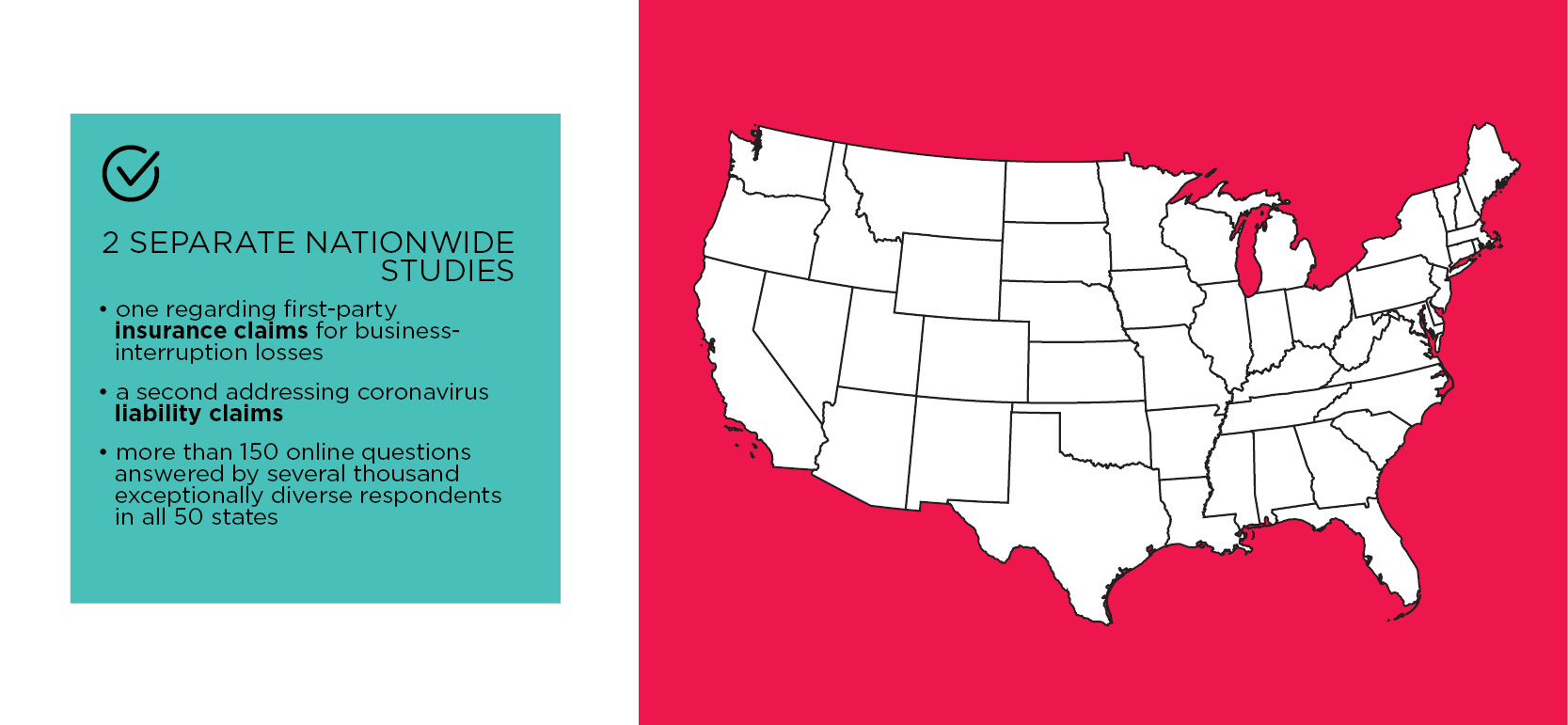
We performed standard analyses of reliability and internal consistency for the measures administered within the survey, and all of them performed at or above standard levels of reliability and internal consistency (a > 0.75). Topics included demographic characteristics, preferred news outlets, media consumption, trust in media, preferred presidential candidate, and the types of insurance respondents carried. Additionally, we asked questions that assessed general attitudes toward lawsuits, personal experiences with COVID-19, and thoughts on masks, social distancing, stimulus payments, and the pandemic shutdown. We also assessed attitudes regarding insurance, behaviors related to COVID-19, and businesses likely to be sued for COVID-19 torts. We crafted hypothetical vignettes that described several fictional civil suits. We obtained thousands of completed surveys and tens of thousands of data points balanced for gender, race, age, socioeconomic status, education, marital status, and employment across all 50 states.
Our survey contained a large number of political and social identifiers for the purpose of helping us correlate respondents’ characteristics and leanings in order to identify certain traits that might make a certain type of individual appreciate the positions taken by the parties in both first-party property cases and tort liability suits. We believe these “filter” identifiers are critical to correlate the relationship among a variety of factors concerning social and political perspectives and how they affect perceptions of insurance coverage, insurance claims-handling issues, tort liability, and damages. It is our intent to repeat both studies later in 2020 and again in 2021 in order to gauge how the country’s attitudes and opinions about the coronavirus and related legal claims continue to change.
Insurance Coverage Research Conclusions
As we’ve experienced in isolated regions following natural disasters, we documented very strong attitudes indicating the willingness of potential jurors all across the country to engage in jury-nullification practices in COVID-19 insurance lawsuits. These include a willingness to ignore virus exclusions, to “rewrite” insurance policies to permit recovery for economically devastated insurance holders, and to express hostility toward the insurance industry for not paying COVID-19-related claims. Nationwide, 71 percent of potential jurors were willing to engage in improper jury-nullification practices related to COVID-19 claims, and 62 percent considered the mere possibility of the coronavirus being present in a building as a form of property damage.
Most potential jurors (73 percent) professed not to understand why insurance companies would deny claims in a time of crisis such as this; 68 percent believed that insurance companies are obligated to protect their policyholders during a crisis, regardless of insurance type. Seventy-two percent agreed that insurers should honor business-interruption claims given that governments forced businesses to close. Three-quarters agreed that insurance companies would cause economic harm by denying business-interruption claims related to COVID-19, and 78 percent said insurance companies should reimburse business-interruption claims seeking to cover losses due to layoffs caused by the virus. Finally, large majorities agreed that insurance companies can help businesses stay open by honoring business-interruption claims (77%) and can demonstrate loyalty to company owners by honoring such claims (70 percent).
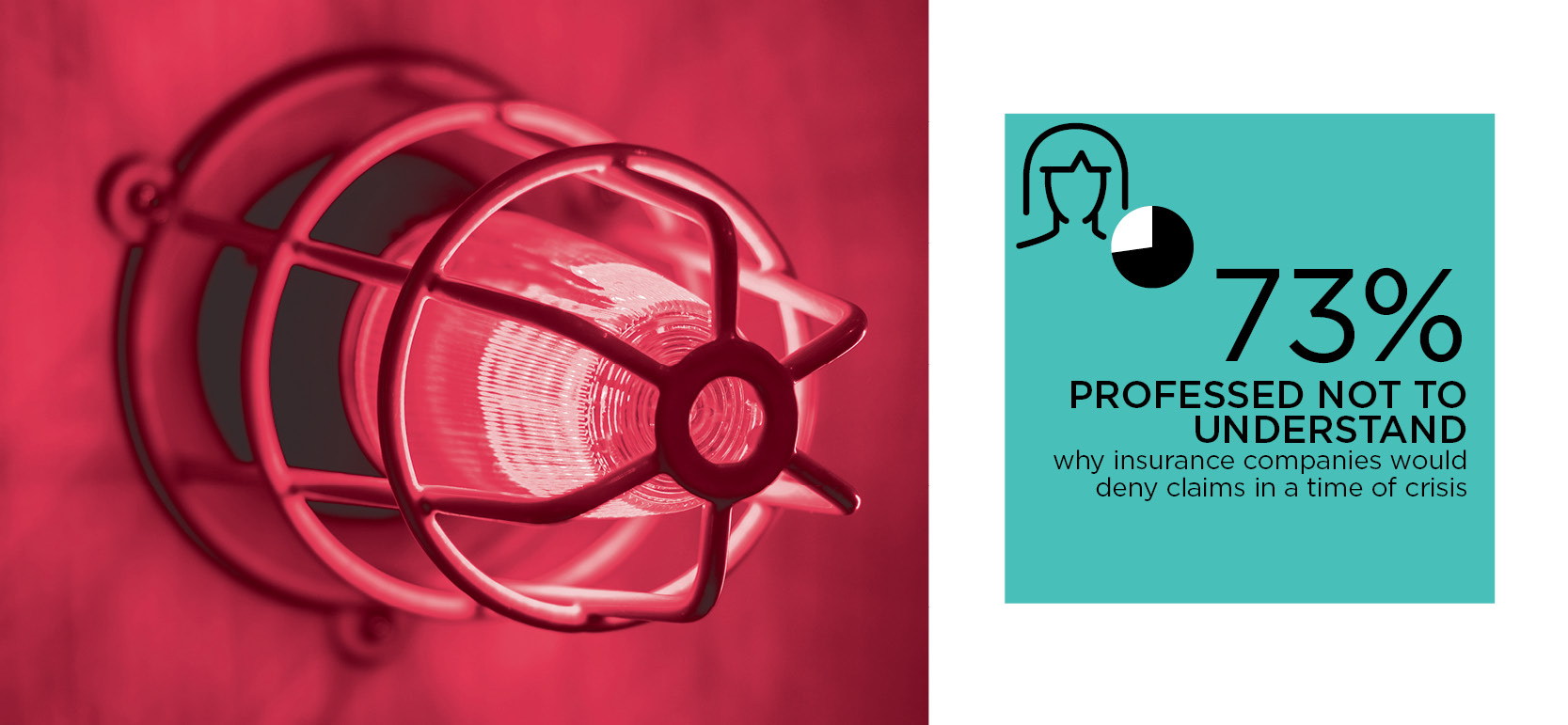
We presented a case vignette in the insurance survey to test the probabilities by which certain people would be more likely to engage in jury nullification. The first hypothetical test case involved a fictitious restaurant, forced to close due to local COVID-19 restrictions, that filed a business-interruption claim denied by its property insurer. In answering questions about the resulting suit, 72 percent of potential jurors voted to award damages to the restaurant. Potential jurors evinced distinct differences in attitude that influenced them to vote certain ways and award specific damages. Our ability to identify these and cross-reference them to the filter factors noted earlier gave us the ability to identify characteristics of the 28 percent of surrogate jurors not inclined to award damages in this scenario; these factors provided the most useful results in terms of our ability to successfully select a jury with a lesser propensity to engage in nullification practices in a COVID-19 insurance trial.
We also developed some distinct insights regarding nullification risks that deserve attention. Most potential jurors, 65 percent, would vote to pay a claim even if the policy did not cover a specific loss or an event like the pandemic. Some 58 percent of surrogate jurors would vote to pay a claim even if there were “black-and-white language in the policy” excluding virus coverage. Nearly 60 percent said they’d be willing to “rewrite” an insurance policy with their vote at trial to cover COVID-19 costs. The key to our research was not the superficial headlines of these conclusions but rather the identification of characteristics of people who disagreed and indicated they would not engage in jury-nullification practices. Although they’re a distinct minority, they do exist, they can be identified, and they can be used to prevent runaway juries in coronavirus insurance cases.
We ran a two-step cluster analysis for the purpose of grouping surrogate jurors together based on demographic factors, political affiliation, attitudes toward various topics in the survey, and the way they voted in our case vignettes. The results revealed four distinct clusters (or segments) of potential jurors and three of them are worth noting. We identified one cluster, consisting of 19 percent of those surveyed, who were ultra-conservative both socially and politically but who became pro-plaintiff jurors if they had been personally affected by COVID-19, whether in terms of personal illness, death in the family, unemployment, or some other negative experience. A second cluster consisted of 29 percent of national respondents who were socially and politically moderate, pro-plaintiff on liability, but willing to minimize damages if they had been only moderately affected by the pandemic or not affected at all. We also identified a pro-carrier cluster, 28 percent of national respondents, who were the least likely to engage in jury nullification—but who, surprisingly, were extraordinarily diverse, shattering every stereotype of a typical “defense juror.”
Although we believe we have documented the single greatest risk of jury nullification in civil cases in the history of American jurisprudence, good news still exists on multiple fronts. First, we identified a measurable group (ranging from 20 to 30 percent of sample jurors, depending on the jurisdiction) who would be willing to fight jury-nullification pressures if they were seated on a jury in a COVID-19 case. Second, each of the three jury clusters that voted for the plaintiff and awarded damages willingly awarded fewer damages than were requested in our hypothetical case.
Tort Liability Research Conclusions
Our tort liability survey tested liability questions primarily around causation-threshold issues, as well as perceptions of various industries. In terms of causation, we documented a clear willingness among jurors in a post-pandemic age to assume the existence of causation, and in some instances expressly reverse the burden of proof to make the defendant prove a lack of causation. For example, 59 percent of national respondents agreed or strongly agreed that they would presume a nursing home caused the premature death of a 73-year-old female who tested positive for COVID-19 while in quarantine and then died two weeks later of heart failure. Similarly, 55 percent of national respondents agreed or strongly agreed that they would “start out leaning in favor of finding liability” against a restaurant sued for causing the death of a waiter’s father because the family believed the son’s job caused him to spread the infection. Likewise, 59 percent of national respondents agreed or strongly agreed that prisons and jails have an obligation “to exercise a high degree of caution to protect inmates from COVID-19 exposure” and would be willing to award damages to inmates who got sick or died if their facility failed to do so.
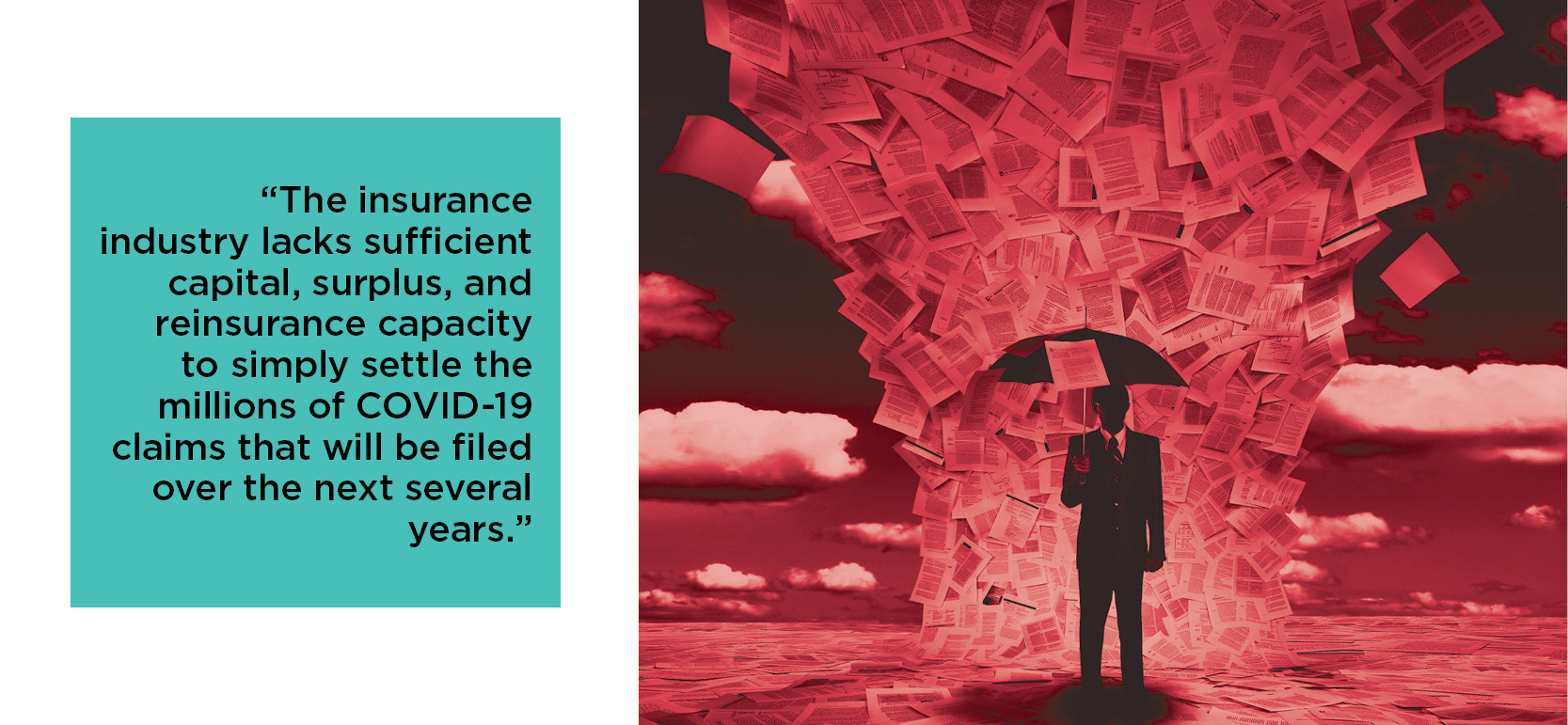
The liability survey also tested post-pandemic perceptions of damage claims in a series of diverse hypotheticals. We documented an increased willingness to award perceived actual damages due to coronavirus losses, but less willingness to award exemplary damages or any other type of punishment. Seventy-two percent of national respondents indicated a willingness to award actual damages due to a restaurant’s “negligent hygiene practices” that caused “multiple people to get sick from COVID-19.” Of the same respondents, just 27 percent were willing to award exemplary damages for the same conduct.
We were also able to identify multiple “filter factors” that could affect a potential juror’s assessment of both liability and damage issues. Strong opinions about mask wearing, social distancing, business and school closures, and public-health priorities showed an overwhelming correlation to a potential juror’s willingness to find liability and award damages to hypothetical COVID-19 tort claims. We did not find the same willingness among jurors in tort cases to engage in the nullification practices we documented in our survey of first-party insurance coverage and bad-faith claims. Our research indicates that potential jurors’ perceptions of defendants in tort liability cases are radically different than in first-party bad-faith cases in which the property insurer is the defendant.
Final Conclusions
In addition to COVID-19 being an unprecedented social, economic, and political experience for all Americans, it is also an unprecedented situation for America’s insurers, our judicial system, and the parties and lawyers who will handle these claims and cases—and unprecedented situations call for unprecedented responses. Insurers have historically tried very few cases arising out of natural disasters; when cases have been tried, the majority have settled. The insurance industry lacks sufficient capital, surplus, and reinsurance capacity to simply settle the millions of COVID-19 claims that will be filed over the next several years. This is literally a trillion-dollar problem that has the potential to make an adverse impact on the entire American insurance industry and, absent Congressional attention, countless millions of consumers could likewise be affected.
Insurers are going to have to make choices about trying COVID-19 claims in various jurisdictions around the country. The primary purpose of our research was to figure out the thoughts and perceptions of prospective jurors who have not already developed strong perceptions against potential defendants in coronavirus claims. Because we found only about 20 to 30 percent of all potential jurors nationwide possess such non-hostile attitudes, our goal was to determine what factors, filters, and other characteristics would help us identify those individuals for our juries. These cases can be won at trial if sufficient resources and insight into the makeup of the ultimate fact finders can be employed in jurisdictions around the country where such cases need to be tried. We hope our work improves the chances for those coronavirus cases to be won at trial.
Christopher W. Martin is the Founding Partner of Martin, Disiere, Jefferson & Wisdom, L.L.P. in Houston. In the last three decades, he has tried more than 140 jury trials in 14 different states defending bad faith or insurance coverage claims. He is a law school professor and the author of 100+ articles and three legal treatises on Texas Insurance Law
